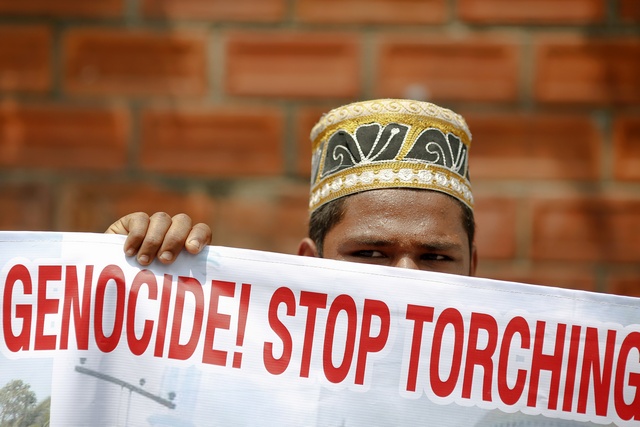Burmese authorities and extremist groups have carried out a “campaign of ethnic cleansing” against the Muslim Rohingya minority in western Burma, through mass executions, forced relocation and persistent denial of aid, a leading human rights group warned on Monday.
In a 153-page report, Human Rights Watch (HRW) outlines evidence for state complicity in systematic attacks against the group – which is denied citizenship by the government – including murder, deportation and persecution, tantamount to crimes against humanity.
“The Burmese government engaged in a campaign of ethnic cleansing against the Rohingya that continues today through the denial of aid and restrictions on movement,” said Phil Robertson, deputy Asia director at Human Rights Watch.
“The government needs to put an immediate stop to the abuses and hold the perpetrators accountable or it will be responsible for further violence against ethnic and religious minorities in the country.”
Based on 100 interviews, the report unveils several first-hand accounts of atrocities perpetrated against Rohingyas by security forces, political parties and members of Burma’s revered monkhood, intended to force the group out of Arakan state.
It uncovers evidence of at least four mass graves dating back to June last year, when Muslims and Buddhists first clashed in Arakan state. In the deadliest attack, at least 70 Muslims, including 28 children, were killed in a day-long massacre in Yan Thei village in Mrauk-U township on 23 October, while security services stood by and watched.
“First the soldiers told us, ‘Do not do anything, we will protect you, we will save you,’ so we trusted them,” a 25-year-old survivor told HRW. “But later they broke that promise. The Arakanese beat and killed us very easily. The security did not protect us from them.”
Another witness recalls a government truck dropping 18 naked and “hog-tied” corpses near a displacement camp in the state capital Sittwe on 13 June, in what HRW described as “a message – consistent with a policy of ethnic cleansing – that the Rohingya should leave permanently.”
“They dropped the bodies right here,” said a Rohingya man, who saw the bodies being dumped. “Three bodies had gunshot wounds. Some had burns, some had stab wounds. One gunshot wound was on the forehead, one on the chest.”
The report identified two groups as being “most influential in organising anti-Rohingya activities” – namely Buddhist monks and the nationalist Rakhine Nationalities Development Party (RNDP), formed in 2010.
Leading members of the RNDP and local monk groups have repeatedly denied the existence of the Rohingya – whom they consider illegal Bengali immigrants – distributed racist pamphlets, called on Buddhists to shun Muslim communities and “physically blocked” aid from reaching the displaced, according to the rights group.
HRW’s claims are supported by the findings of a DVB field investigation to Sittwe in December.
“The [Rohingya] have a plot to take over this land by increasing their population,” Khin Maung Gree, RNDP executive committee member, told DVB in a candid interview. “Part of their agenda might be to spread their religion.”
“There is always a tendency for terrorism in the hearts of the so-called Rohingya, Bengali kalars,” Ashin Kumara, head monk at a Sittwe monastery, added. “Our race has to be maintained, our religion has to be maintained, our country has to be protected.”
The Rohingya, who comprise around 800,000 people in northern Arakan state, were stripped of their citizenship by former military dictator Ne Win in 1982, and continue to be denied basic rights, including freedom to travel and marry.
The Burmese government has repeatedly been criticised for preventing aid from reaching displaced Rohingya, who are estimated to make up most of the 125,000 people uprooted in last year’s clashes.
“The problem with aid delivery in Arakan state is not a failure of coordination, but a failure of leadership by the government to allow displaced Muslims access to aid and freedom of movement,” Robertson said.
But a spokesperson for the quasi-civilian regime, led by President Thein Sein, rejected the findings of HRW’s report as “biased” and “questionable”.
“The [Myanmar government] will only accept and implement the findings and suggestions made by the official investigation commission,” said President’s Office spokesperson Ye Htut in a statement released on Monday, referring to the 27-member body established by Thein Sein in August last year to “reveal the truth behind the unrest”.
The official commission is due to release its highly anticipated report this week, after delaying its findings in the wake of fresh anti-Muslim unrest, which swept through Burma in March. But Robertson told DVB that he “looks forward” to reading the official report and that if the government ”were wise” they would recognise that both reports are “legitimate points of view”.
“This is not an ‘us versus them’ situation – it’s a case where rights violations have occurred and not been addressed,” he told DVB on Monday.
Ye Htut also questioned the timing of HRW’s report, which coincides with a meeting between the EU’s foreign ministers to discuss lifting sanctions against the former pariah state. But Robertson told DVB that the EU, which is expected to formally end Burma’s economic isolation on Monday, has repeatedly failed to address rights abuses in Arakan state.
“We don’t want to rain on other peoples’ parade, but there is an important contrast that needs to be addressed here,” he said. “Why is the EU giving an all clear to the Burmese government when we’ve found that there’s ethnic cleansing and crimes against humanity going on? This is a question that the EU needs to answer.”
Tens of thousands of Rohingya Muslims, including women and children, have fled Arakan state since last year, often making the perilous journey by sea on rickety boats in the hopes of reaching Malaysia or Indonesia. According to government figures, nearly 200 people were killed in last year’s violence, but HRW insists the numbers are likely to be a “serious underestimation”.



